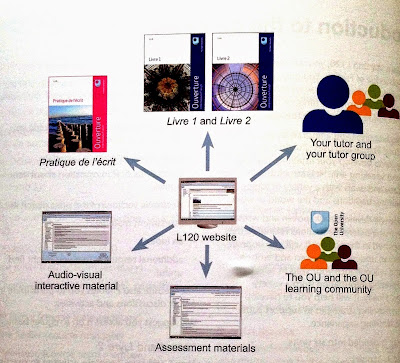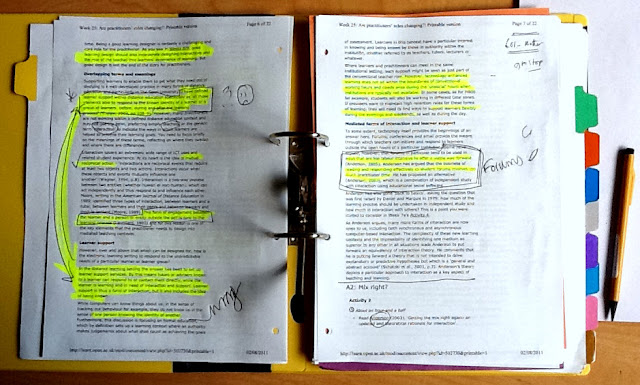H800 WK21-22 Activity 2d VLE vs. PLE who wins?
- John Petit
- Martin Weller
- Niall Sclater
Stephen Downes – Students own education
· How much do they actually differ in their views?
· What is my perspective?
· Freedom is lack of choice
· Parameters work
· Creativity is mistakes
· Have rules, the mischievous or skilled will break them anyway
· The end result counts.
a) This isn’t a debate. Neither takes sides and the chair interjects his own thoughts. A debate, whether at school, university or in a club, or in a court of law or the House of Commons, is purposely adversarial, people take sides, even take a stance on a point of view they may not wholly support, in order to winkle out answers that may stand somewhere between the two combatants.
b) During the MAODE this might be the second such offering as a ‘debate,’ the last being as weak. What is more I have attended a Faculty debate which shilly-shallied around the issues with at times from an audience’s point of view it being hard to know whose side the speakers were on?
c) As well as deploring the lack of rigour regarding what should or should not be defined as a debate, the vacuous nature of the conversations means that you don’t gain one single new piece of evidence either way. Generalities are not arguments, neither side attempts to offer a knock-out blow, indeed Martin Weller seems keen to speak for both sides of the argument throughout.
When Martin Weller implies that a VLE constrains because ‘There are so many fantastic tools out there that are free and robust and easy to use.’ I would like a) example b) research based evidence regarding such tools, which do offer some compelling arguments, these commercial and branded products have to offer something refreshing and valuable.
Unlike some university offering they are therefore not only effective, but vitally, they are fun, tactile, smartly constructed, well-funded, give cache to the user, are easy to share, champion and become evangelical about, explored, exploited and developed further. Here I compare Compendium with the delight of bubbl.us.
Here I compare blogging in the confines of the abandoned cold-frame that is the Victorian OU student blogging platform compared to the Las Vegas experience of WordPress.
I can even compare how WordPress performs externally compared to the shackled version provided by the OU. On the one hand there is a desire to treat students like sheep; there is even a suggestion in this chatty-thing between Niall Sclater and Martin Weller than OU undergraduates ought to offer the most basic environment in which to operate. Access is an important point, but you don’t develop players in an orchestra by shutting everyone in a hall and giving them a kazoo. And if that Kazoo requires instructions then it deserves being ignored. Having lived with it for a year the OU e-portfolio My Stuff might best be described as some kind of organ-grinder with the functionality and fun-factor of Microsoft DOS circa 1991.
Martin Weller makes the point about tools that might be used this before, during and after their university experience. There is a set of ICT tools covering word-processing, databases, number manipulation, calendars and communications that are a vital suite of skills; skills that some might already have, or partially have … or not have at all. The problem is in the accommodation of this widely differing skill set.
JV Exposure to new, or similar, experience of better as well as weaker programmes/tools, fashion, peer group, nature of the subject they are studying, their ambitions, who they are, how much time they have, their kit, connection and inclinations, let alone the context of where they are going online.
In this respect Martin Weller is right to say that ‘some kind of default learning environment’ is required first of all.
Caveat: You are going to need people to use the same kind of things in order to be able to communicate.
· University blog vs. their own bog.
· University e-portfolio vs. their own portfolio.
· Elluminate vs. Skype.
· Mac vs. PC,
· Tablet vs. laptop.
· Desktop vs. smartphone.
· Paper vs. e-Reader.
· University Forum vs. Linked in or others.
· Twitter vs. Yammer.
Swimming analogy: training pool, leisure pool, main pool, diving pool, Jacuzzi.
Niall Sclater makes a point about a student using an external blog that doesn’t have a screen reader. Do browsers not offer this as a default now? Whilst I doubt the quality of translation I’ve been having fun putting everything I normally look at into French or loading content onto an e-reader and having it read to me on long car journeys. The beauty of Web 2.0 and Open Learn is that developers love to solve problems then share their work. Open Learn allows these fixers to crack on at a pace that no institution can match.
Perhaps issues regarding passwords is one such problem which is no longer a problem with management systems. Saving passwords etc.: Other problems we have all see rise and fall might include spam. The next problem will be to filter out spam in the form of ‘Twitter Twaddle’ the overwhelming flack of pre-written RSS grabbed institutional and corporate messages that should without exception be ‘flagged’ by readers as spam until it stops. I never had a conversation with a piece of direct mail shoved at me through my letter box, or spam come to that matter. Here largely the walled, university environment in which to study, is protected from the swelling noise of distraction on the outside,
Niall Sclater talks about the Wiki on OU VLE, in Moodle ‘comprises what we consider is the most useful functionality for students. The OU ‘cut out a lot of the bells and whistles you find in MediaWiki’. New to wikis I enjoyed being eased into their use, but like a keen skier, or swimmer, having found my ‘legs’ I wanted incremental progressions. Being compelled to stay in the training pool, or on the nursery slopes, to return to by Kazoo metaphor, is like having Grade 5 flute, but having to play with six novice recorder players in Kindergarten. We move on and therefore what is offered should move with us.
Universities fail abysmally to sell their products to their captive audiences.
Commercial products are sold, invitingly to everyone who comes within earshot. There is a commercial naivety and intellectual arrogance sometimes over stuff created that must be great, because it is the invention of brilliant minds … and that its brilliance will be self-evident even if it sits their within its highly branded overcoat waiting for some time to take an interest and take it out for a test drive. Creators of these tools forget that a quick search using some of the terms related to the affordances of the product being offered will invariably produce something more appealing from the likes of Google, Adobe, Apple or Microsoft.
Nail Sclater points out that some students can be confused by too much functionality. I agree. If there is a product that has far too much functionality, it is Elluminate. And even for a library search, it ought to be as simple as the real thing … you go to a counter and ask for a title. Google gets it right. Keep it simple. Others are at last following suit. Or is the Google God now omnipresent?
Martin Weller stumbles when he says that Nail ‘hits on two arguments against decentralised PLEs by
a) Giving three arguments
a. Authentication
b. Integration
c. Robustness
b) He is meant to be in favour of PLEs.
i.e. academics are incapable of debate because they are, to use of Martin Weller’s favourite terms ‘contextualised’ to sit on the fence. A debate should be a contest, a bullfight ideally with a clear winner, the other party a convincing looser.
You wouldn’t let a soldier chose his weapons then enter the fray. There has to be a modicum of formal training across a variety of tools, and in a controlled, stepped fashion in order to bring people along, communally, for retention and to engender collaboration and participation and all that benefits that come from that.
Who at a time of change is going to declare their role, or department redundant? Brought into a new role, Social Media Manager, I feel I will have succeed in 12 months if I have handed over the keys to others, spread some of the glory about. That’s how I see it, a little bit of everybody’s lives. You can wordprocess, you can do some aspect of Social Media. There are other functions though that long ago were circumvented by clever software. Web 2.0 deplores the gatekeeper. It wants to put everything ‘out there,’ enabling everyone and anyone to make of it what they need and please.
Personally I’ve been loading content, text and images, in diaryland since Sept 1999 and have never had an issue with access, yet I have repeatedly found my OU e-portfolio failed, or that while composing a response in a forum the system fell-down and I lost what I was doing.
Nial Sclater argues in favour of VLEs to ensure usability, access, extension to students, common ground on terms of tools, opportunity and form an assessment point of view, use of content too.
While Martin Weller wants to ‘Support’ – an argument for VLEs. (I’ve now made the point several times that Martin Weller seemed unsure of which side he was on, and by personality and from experience, will never take a side in any case).
We DO want people going away being able to use package X. Do we turn out Roy Castle types who can play loads of instruments not very well, or a virtuoso performer who can at least play the cello well?
JP stepping in ‘as my confidence grew I got to know that and my confidence grew across the year as I got to know that and one or two other very limited and well-supported tools’
Nial Sclater’s point that the same tool is required for collaboration and assessment. This applies also to reading the materials provided and doing the activities so that these are the points of reference for assessments (as currently practised). How can a Tutor mark an assessment that is based on vegetables from a walled Victorian kitchen garden, when the student offers flowers grown from seed in a tub? To return to my sporting analogy, how might I judge a person’s ability to swim after 12 weeks if they’ve been learning how to sail?
Parameters have a purpose.
The greatest resistance to a writer is having no sense of purpose, no goals, no parameters, no set pieces, no one to be on their case. A free for all, perhaps as the new London Business and Finance School is finding, is that just giving students the lot and telling them to get on with it is not conducive to a viable learning experience. (Nor do I think it’ll deliver someone is able to work with others).






